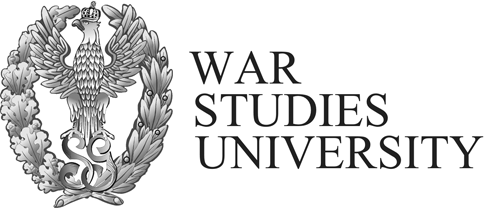Online first
Current issue
All issues
About
Aims and scope
Peer review process
Publication policy and ethics & malpractice statement
Editorial Board
Reviewers
Publisher
Guide for authors
Call for papers
Book Reviews
Special Issues Archive
New and emerging technologies in defence education, training and governance
Peer review process
Upon online submission, the uploaded files are converted to a single PDF file, which is used in the peer-review process. All of the journal’s content is subjected to peer-review that is defined as obtaining advice on individual manuscripts from reviewers’ experts in the field. The editors retain a right to reject the submission without review if it fails to meet the following criteria:
Reviewers’ Responsibility
Revised manuscript submission
General duties and responsibilities of the Editor-in-Chief and International Editorial Board members
- It is beyond the scope of the journal (for aims and scope see here);
- It does not offer substantial new knowledge nor added value;
- It fails to present the global dimension of the discussed issues;
- It fails to meet the editorial guidelines (for a guide for authors see here, template);
- It is written in poor English;
- It contains serious mistakes or faults;
- It contains poor bibliography: out-of-date, locally-published entries that are not included in international databases (such as Scopus, Web of Science, DOAJ, EBSCO).
The authors are welcome to submit the names and e-mail addresses of potential reviewers because they know best who is an expert in their field. However, the Editors retain the sole right to decide who reviews the manuscript. Reviewers are appointed based on their expertise in the appropriate field. All manuscripts are refereed by at least two reviewers in a double-blind review process, which ensures an objective and impartial evaluation of scientific merit of the paper. The reviewing operation is managed through the submission system. Reviewers are given 4 weeks to return their review and reminders are sent. However the journal cannot guarantee a time to decision since reviewers may be late, or there may be problems in finding the right reviewer. In all cases the journal editorial office will endeavour to manage the process as fast as possible. Reviewers send an opinion in the form of the review report see here. Authors are asked for adequate revisions of their papers (with a second round of peer-review if necessary) before a final decision is made. The final decision is made by the academic editor (usually the Editor-in-Chief of a journal or the Guest Editor of a Special Issue). Accepted articles are copy-edited and English-edited.
Reviewers’ Responsibility
Reviewers are required to:
- Provide an unbiased review of the paper rooted in their current understanding of the field and of the recent research and literature;
- Complete their reviews within the timeframe agreed at the time of accepting the request to review. This timeliness is important in helping authors achieve publication within a reasonable time and in keeping issues of the journal on schedule;
- Inform the editor of any substantial similarity to other papers of which they are aware;
- Point out relevant published work which is not yet cited;
- Treat all review materials in confidence;
- Inform the editor if they believe they may have a conflict of interest in undertaking the review (for example, but not limited to, declaring any professional or personal relationship which might compromise the review).
SDQ aims to provide an efficient and high quality publishing service to authors and to the scientific community. We ask reviewers to assist by providing review reports in a timely manner.
If you wish to become SDQ reviewers, please send your CV to sdq@akademia.mil.pl or to the Editor-in-Chief.
SDQ complies with the Committee on Publication Ethics Guidelines for Peer Reviewers see here; which provides a comprehensive guide to the ethics of peer review.
Reviewers evaluate the manuscript taking into consideration:
- Novelty and originality of the work;
- Significance to the field;
- Rigorous methodology;
- Study design and clarity;
- Quality of content.
Manuscripts submitted to SDQ should meet the highest standards of publication ethics:
- Manuscripts should only report results that have not been submitted or published before, even in part;
- Manuscripts must be original and should not reuse text from another source without appropriate citation.
If reviewers become aware of such scientific misconduct or fraud, plagiarism or any other unethical behavior related to the manuscript, they should raise these concerns with the editorial team immediately. For further guidance about writing a critical review, reviewers are advised to refer to COPE Ethical Guidelines for Peer Reviewers. Committee on Publication Ethics see here.
On receipt of at least two reviews, the Editor-in-Chief will make a decision of (1) accept, (2) minor revision, (3) major revision, or (4) reject. The reasons for the decision will be communicated to the authors. If a manuscript does not meet the standards of the journal or has other major deficiencies, the reviewers will express constructive criticism to help the authors improve their paper. If a manuscript is acceptable for publication but needs to be improved, the authors can submit the revised paper. However, they should address all of the reviewers’ suggestions; if the author disagrees with the reviewers’ comments, they should provide a point-by-point rebuttal to every comment. When the decision of minor/major revision is made, and the authors do not revise their articles satisfactorily after receiving a reviewer report, then the Editor-in-Chief reserves the right to reject the article. When revised articles are received they will either be sent out for further review or the Editor-in-Chief will make a decision depending on the level of revision requested.
Revised manuscript submission
The authors will be informed of the reviewers’ decision to either accept (with or without revision) or reject the manuscript. When the manuscript is requested to be revised, the authors should do so as soon as possible.
The final decision is made by the Editor-in-Chief.
The Editors reserve the right to make necessary corrections to the manuscript without consulting the author, including editorial changes and stylistic errors.
The manuscript may not be changed once it is published.
SDQ does not charge authors an open access publication fee.
The final decision is made by the Editor-in-Chief.
The Editors reserve the right to make necessary corrections to the manuscript without consulting the author, including editorial changes and stylistic errors.
The manuscript may not be changed once it is published.
SDQ does not charge authors an open access publication fee.
General duties and responsibilities of the Editor-in-Chief and International Editorial Board members
The Editor-in-Chief and International Editorial Board members should take all reasonable steps to encourage the quality of the material they publish. They strive to improve the journal, and meet the needs of readers and authors.
The Editor-in-Chief accepts or rejects articles based on reviews, and makes the final decision on publishing or rejecting an article.
Editorial board members act as ambassadors for the journal, supporting and promoting it. They seek the best authors and actively encourage submissions. They review submissions to the journal, attend member meetings, and accept commissions to write reviews and commentaries on papers in their specialist area. Editors and Editorial Board members champion the freedom of expression and maintain the integrity of the academic record. Editors are always willing to publish corrections, clarifications, retractions and apologies when needed.
The Editor-in-Chief accepts or rejects articles based on reviews, and makes the final decision on publishing or rejecting an article.
Editorial board members act as ambassadors for the journal, supporting and promoting it. They seek the best authors and actively encourage submissions. They review submissions to the journal, attend member meetings, and accept commissions to write reviews and commentaries on papers in their specialist area. Editors and Editorial Board members champion the freedom of expression and maintain the integrity of the academic record. Editors are always willing to publish corrections, clarifications, retractions and apologies when needed.
We process personal data collected when visiting the website. The function of obtaining information about users and their behavior is carried out by voluntarily entered information in forms and saving cookies in end devices. Data, including cookies, are used to provide services, improve the user experience and to analyze the traffic in accordance with the Privacy policy. Data are also collected and processed by Google Analytics tool (more).
You can change cookies settings in your browser. Restricted use of cookies in the browser configuration may affect some functionalities of the website.
You can change cookies settings in your browser. Restricted use of cookies in the browser configuration may affect some functionalities of the website.




